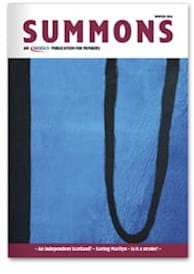WHEN I was an undergraduate I became seriously ill. During that most difficult of times, a GP gave me her home telephone number. At the time, I was touched by her kindness, but thought little of the scrap of paper that she handed me as I left the surgery, saying “call any time”. In the 25 years that have passed I have often thought of that doctor and what she did when she offered her personal number to a frightened young woman.
Yet, despite the frequency with which I have returned to that encounter, I remain unsure about what I think. Indeed, I have two distinct and perhaps contradictory responses to how she acted. The rational and academic side of me worries about her decision to give me her home telephone number. In so doing, she indubitably crossed a boundary. She treated me differently from other patients (unless, of course, she was in the habit of inviting all her patients to call her at home whenever they wished – which I doubt). She opened up her private life to someone whose vulnerability might have led to an unhealthy dependence and even damage were she unable to meet my expectations.
This GP might have distorted the ways in which I perceived doctors and their availability to me. Her actions could have created splits within the broader clinical team charged with my care. I worry too about the implications for the doctor herself. By inviting patients into her private life, she ceased to have the time we all need to regroup and relax. In blurring boundaries and compromising her time away from being a doctor, I worry that she may have made herself vulnerable to burnout.
But there is another part of me that has a quite different response. On a human level, I am awed by her compassion, her commitment and the meaning that she gave to the term “care”. I was scared and she reached out to me in a way that was transformative. With that small expression of kindness, that GP ensured I felt that I mattered and that I could cope with what was to come, whatever that might be. And, it was significant that I had her support when I needed it and that it wasn’t confined to surgery hours and limited by my ability to get past the switchboard. I believed, and continue to believe, that I had been fortunate to meet a doctor who was remarkable in her altruism and unselfishness.
Professional boundaries have received increasing attention, both in healthcare education and clinical practice. The arguments in support of boundaries are well-rehearsed and I find them persuasive. Boundaries reflect the distinct nature of the healthcare relationship and facilitate safe practice for both professional and patient. Clinicians do not respond to their patients as they would a friend and that is important for both parties. For let us not deceive ourselves, boundaries serve the professional as much as the patient: managing expectations and containing difficult emotions within the structure of the consultation. Boundaries make resilience possible and resilience makes continued clinical practice possible.
For me, the negotiation of boundaries is an integral part of the ethical interpretation of professional discretion. Of course, there are some circumstances that constitute an unequivocal boundary violation, for example, financial exploitation of, or a sexual relationship with, a patient. However, most clinicians never come close to such behaviour, but they are required to navigate the complex subtleties of professional boundaries every day as they choose what to disclose about themselves, whether to accept a gift or how to respond to an invitation to a social event
At the risk of sounding like a stereotypically compromising ethicist, I believe that whilst blanket bans or uncompromising rules may be convenient, they do not capture the essence of what it means to negotiate boundaries in clinical practice. To be professional is to have to use one’s judgement and to exercise discretion. Doing so in relation to boundaries is difficult, but necessary.
So, did I ever call that GP’s home number? I confess that I did. I remember vividly receiving a letter in the second post which prompted me to call the surgery to discuss its implications. The doctor was, I was told, on leave. I hesitated for several hours, but eventually yielded to the impulse and retrieved that scrap of paper. The phone was answered by a hassled-sounding man whom I guessed was her partner. In the background, I could hear young children playing. I realised immediately what an intrusion my call was into her family life. When she came to the phone, I apologised profusely for the imposition and she, with characteristic generosity, gently reassured me and encouraged me to talk to her about my distress.
For that, I will always be grateful.
Deborah Bowman is Professor of Bioethics, Clinical Ethics and Medical Law at St George’s, University of London
This page was correct at the time of publication. Any guidance is intended as general guidance for members only. If you are a member and need specific advice relating to your own circumstances, please contact one of our advisers.
Read more from this issue of Insight

Save this article
Save this article to a list of favourite articles which members can access in their account.
Save to library